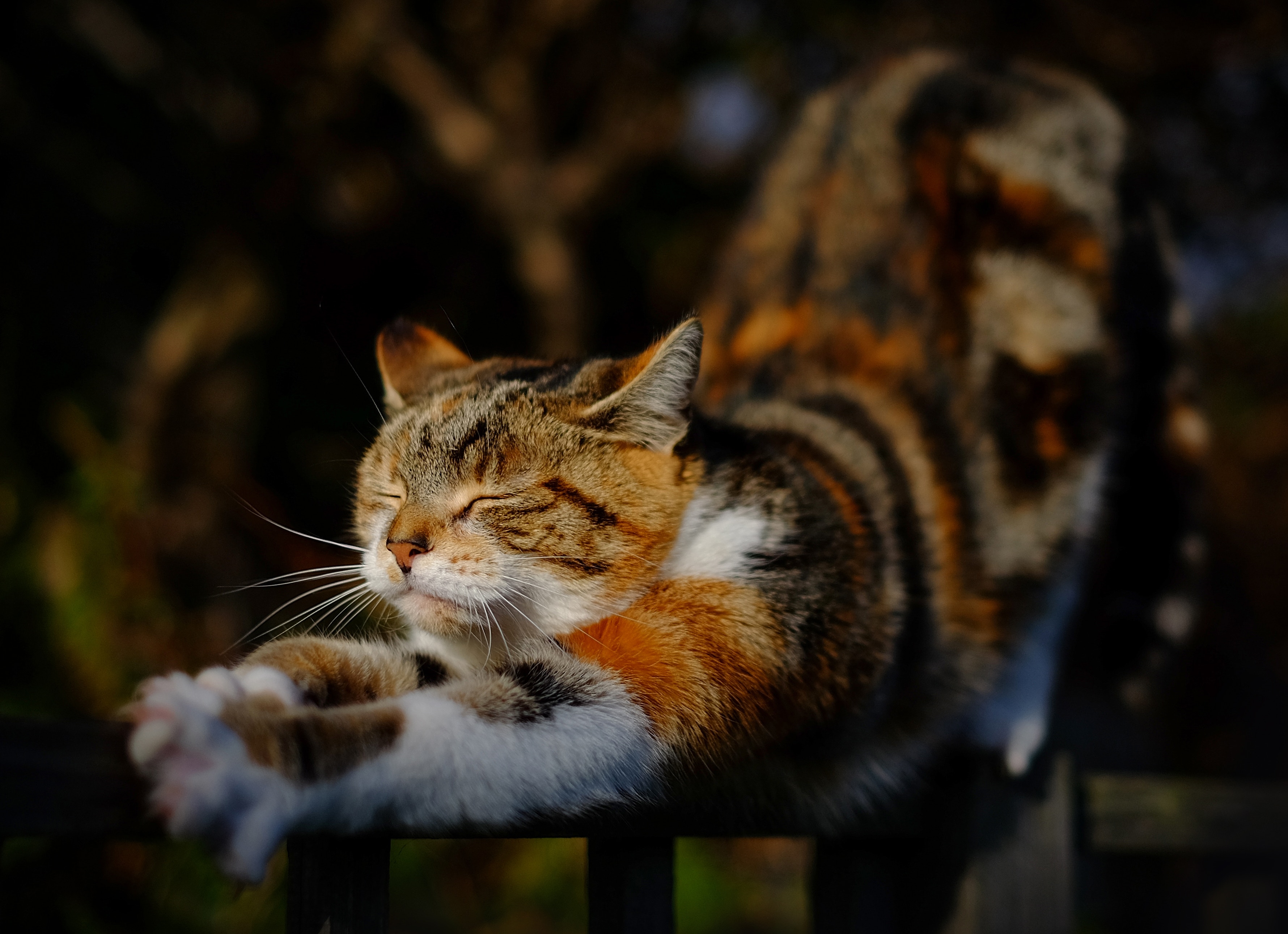Lessons from Felines
Some people say cats are lazy. I believe they know what’s good for them. Unlike us, they are well aware of the importance of rest. Why waste energy, they say, when they can stay fit by moving their muscles more efficiently?
Sure cats take lots of naps, but when they wake, they yawn and stretch all their muscles to the limit, moving breath throughout their bodies and maintaining flexibility with minimal effort. They are able to move quickly when prey appears, but don’t feel the need to jog for miles a day if short walks seem sufficient.
Our bodies may require a bit more aerobic exercise than a cat’s physical system does, but we need to remember the importance of sleep and gentle ways of moving that can benefit our well-being.
Morning Madness
Do you awaken on your own, coming to life gradually before the alarm tells you it’s time to start the day?
Or does a ring, a radio or a signal from your phone jar you to consciousness, just in time to throw back the covers and fly from bed, rushing to shower, dress, and grab a “to go” breakfast as you charge out the door toward a workday that awaits with more hurried moments and triggers of stress?
I must admit, many of my mornings resemble the second scenario more closely than the first.
Some days my regular job requires me to arrive by eight thirty, something that doesn’t come naturally to me. I’m not an early riser when it’s not required. I stay up late, trying to make the most of the seeming lack of hours in the day to accomplish personal goals, after serving required time at a professional position. Perhaps you may be dealing with a similar dilemma.
The Problem With Rude Awakenings
If we don’t have sufficient time to sleep, we set the alarm for the last possible moment. But when we are jarred into wakefulness, a stress response is experienced.
Our mind goes from park into high gear, missing first and second, thus preventing the opportunity to focus upon and organize our planned actions for the day.
Physically, without time to relax and prepare our muscles to resume activity, they won’t work as efficiently.
Contrast that scenario with the experience of rising in one’s own time, mentally preparing plans for the day, and leisurely stretching our muscles to clear the kinks formed by lack of movement over the previous hours.
Stretching while the body still holds the heat of sleeping under warm coverings allows muscles and tendons to lengthen with less risk of injury. Focusing upon a logical course of accomplishing goals while quiet and relaxed makes for a much smoother, more productive day.
A Huff Post article suggests stretching can help increase your energy level too. I know I feel more physically refreshed and energetic after a relaxing session of morning stretching.
So I’ve made the case for eight or more hours of shut-eye and plenty of time to stretch your body and awaken your mind, you say? But you’re still not sure you can follow through.
Sometimes, even though we know what’s good for us, implementing positive intentions can be a challenge.
Natural Rhythms of Rising and Retiring
When not facing scheduled commitments, we would each fall into a natural pattern regarding sleeping and waking hours.
Unfortunately, most of us must follow the schedule created by our employer. This natural tendency can be a barrier to achieving proper rest if our required schedule doesn’t match our natural inclinations.
Addressing this problem isn’t always easy but is essential. We can request a different schedule, find another position where we have some input concerning our required working hours, or adapt our mind and body to the schedule we must follow.
Benefits Bring Motivation
Often, I must admit, it’s simply impossible for me to retire at the time I need to in order to obtain sufficient sleep. But to make up for the short nights, I make it a point to sleep in on days when I don’t have morning commitments.
On those days, I awaken on my own. I listen to the chirp of birds outside my window in summer, or, in winter, focus upon gratitude for the hum of the furnace as I lie for a few minutes, sometimes longer savoring the state that’s not quite sleep, not yet wakefulness. Without really thinking about it, I begin to stretch in ways my instincts tell me I need to. I assume a few yoga positions I need to do on a regular basis to stay somewhat flexible as I age. I make a mental note of priorities from my lengthy “to-do” list.
After a time, I feel I have the courage to face my day. I swing my legs off the bed with a lot more enthusiasm than on the mornings when I’ve had a short night or simply didn’t take the time to stretch and prepare myself for the day.
Since making sure I’m completely rested and flexed on at least a few days each week, I’m feeling better, moving more freely, and coming up with more creative ideas.
I have had to limit my personal day ambitions in order to sleep in and build up strength to maintain the ability to fulfill professional ones most important at this time. But rather than dwelling on the idea that I’m giving up something, I consider the fact that I’m maintaining better focus upon the personal projects I’ve prioritized.
I’ve come to realize that staying up late to sort out a problem or finish a project doesn’t pay. Conversely, if I “sleep on a problem”, often the answer to a dilemma or the perfect way to put my thoughts into words regarding a writing project will “dawn on me”.
We work and think so much more efficiently when mentally and physically rested. Struggling to stay awake to work is such a waste of time.
It’s never easy to get started on a new way of living. We must force ourselves to do what we at first feel to be counter-intuitive. Once we see results, however, it’s easier to stay with the new program.
The Essentials of Stretching
Bob Anderson, author of Stretching, a pioneering book in print for thirty-plus years, says that, among many others, one benefit of stretching is to: “Help loosen the mind’s control over the body so that the body moves for ‘it’s own sake’ rather than for competition or ego”.
A very eloquent statement. We put pressure upon ourselves to perform well in so many ways. So often, the solution to the best performance is to lessen that pressure and allow our native intelligence to take over.
Intuition is a great guide. When we awaken mentally rested, we instinctively feel areas of tightness. We possess the strength and motivation to stretch, and relieve the tension, a strength we can’t muster if we’re too tired to move.
I don’t follow a specific series of stretches. I move in ways I feel I need to on that particular day.
That’s what works for me. If you feel more comfortable keeping a list of specific stretches by your bedside as a guide, that’s perfectly fine too, (there’s an excellent list of morning moves in the above mentioned book) and here’s a link to a list of good stretches to perform before rising.
This article was inspired by my own experience but an increasing amount of research seems to support the importance of stretching, and the fact that waking is the best time to do so.
A recent Livestrong article details the benefits of morning stretching, and an azcentral piece mentions studies which have demonstrated potential benefits of adding stretches to one’s morning routine.
My sleep schedule is far from perfect. I’ll never be as serene and flexible as my feline pets. But by making modest improvements in my sleep schedule, and performing regular morning stretches, I’ve been able to regain a range of motion I thought was permanently lost due to age and injury. You can too.
If you’re ever in need of inspiration, adopt a cat and watch his or her morning routine. Residing with a feline has other health benefits also. But that’s a tale for another time.


